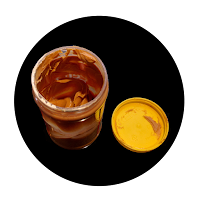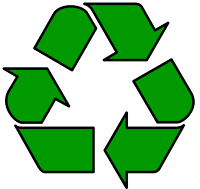Five Things I Learned About Recycling While Putting Together The Quiz
- I can recycle more than I thought I could. Over the years I've trashed a lot of stuff I should have recycled.
- I wasted time and resources getting my recycling too clean. For food containers, they have to be basically empty but not spotless.
- I erred on the side of caution too much. I would trash things that I thought were marginal or wasn't sure about; I probably should have put them in recycling and let the experts make the decision.
- Plastic films are a PITA for recyclers. They can mess up machinery and slow the process down. Throw out the clear plastic covers from microwave meals. And recycle plastic bags at the grocery store or other drop off centers. Don't put either in curbside recycling bins.
- Taking photos of things you pull from the trash or recycling for a blog post can garner dirty looks from your S.O.
Quizzes As A Tool For Informing And Engagement
Here are a few things I learned about online quizzes while working on the recycling quiz project.
- Online quizzes can be used for more than pure entertainment, and they can still be entertaining.
- It takes time to do it right. I spent a lot of time writing questions, taking photos and checking the answers for clarity and still see things that I wish I had done differently.
- My gut feeling is that people will retain more from taking a well-constructed quiz than stepping through a slideshow or reading a list of bullets -- if for no other reason than that they're more involved.
Baltimore City Curbside Recycling Quiz - Results!
Over 500 Baltimoreans have taken our recycling quiz so far. If you haven't, please take it first before reading the following.
Disclaimer aside, on with the results!
Overall, 67% who started it finished it, which is pretty good for a quiz of this length according to the people at Qzzr.
The average score was also -- interesting enough -- 67% correct.



#1: How to properly recycle a wet newspaper in a plastic bag. Only 40% chose the correct answer, which was to remove the bag, recycle the newspaper curbside and put the bag with other bags for recycling at a place that accepts them, like most grocery stores.
Disclaimer aside, on with the results!
Overall, 67% who started it finished it, which is pretty good for a quiz of this length according to the people at Qzzr.
The average score was also -- interesting enough -- 67% correct.
So which questions were most difficult?



#1: How to properly recycle a wet newspaper in a plastic bag. Only 40% chose the correct answer, which was to remove the bag, recycle the newspaper curbside and put the bag with other bags for recycling at a place that accepts them, like most grocery stores.
Lightweight Turbojet Jet Pack With 10 Minute Flight Time
Check out footage of the JB-9, a lightweight Jet Pack in development. Great video, though we were disappointed that the pilot did not attempt to fish during the demonstration.
More details about the flight and the jet pack are here on sciencealert.com.
More details about the flight and the jet pack are here on sciencealert.com.
Be A Better Recycler In Baltimore City -- Take Our Quiz!
Today in Jet Packs spent about a month collecting and photographing things that we weren't sure about when it comes to recycling. We then showed the photos to Robert Murrow, Recycling Coordinator of the city of Baltimore (home of TiJP), and asked him questions about what we recycle and how best to do it. He offered a lot of useful advice which was incorporated into the following quiz. Take it and see how much you know about recycling in Baltimore -- and how you stack up against others.
The quiz doesn't cover everything, though. Visit the recycling section of the Department of Public Works site for a complete guide.
After you've finished the quiz, see the results.
Dubai Orders 20 Jet Packs For Skyscraper Firefighting
Jet pack news is coming fast and furious these days. Dubai signed an agreement with New Zealand's Martin Aircraft to purchase a fleet of jet packs for use when fighting fires in skyscrapers. Gizmodo has the details.
Jet Pack In The Big Apple
Just days ago, a jet pack flew near Lady Liberty:
Is the future finally getting closer?
Is the future finally getting closer?
Experiment: Getting By With A Six-Year-Old Android Phone
I used my old Android phone as a daily driver for a month. How did I survive? Click on to learn...
Labels:
Android,
crisitunity,
experiment,
HTC Hero,
Nostalgia
Awesome Flyboarding Frisbee Catch
I didn't attempt this back when I gave Flyboarding a try, but perhaps I will if I get the chance. A perfect throw and a perfect catch. Is Flyboarding Ultimate the sport of the future?
Six Reasons Your GoPro Videos Suck (And Mine Do Too)
I’ve captured some great footage with my GoPro camera. I’ve also taken boatloads of mediocre footage and created at least a few videos that didn’t have the pop I wished they had. Here are six reasons my footage hasn’t always been up to snuff, with some tips on getting around these issues. If you've been at this for a while, a lot of these are probably quite obvious -- this is probably most helpful to newbies.
1) One long continuous shot is usually not that interesting, unless the footage is stellar . As viewers, we expect multiple camera angles in even :15 commercials. Full-length movies are made up of thousands of individual shots. Even a basic two-way interview employs two cameras switching back and forth throughout. Purposely long shots do have their place, of course, but how many different shots are you using in your GoPro videos?
 |
| Sure, it was fun to ride. But is twenty-five minutes of this fun to watch? |
Brewing Experiment: Reusing Yeast Via Yeast Rinsing
My next brewing experiment was with yeast rinsing, a process where you can harvest active yeast from the sediment at the bottom of a carboy, store it in your fridge, and re-use it to brew another beer. This experiment was in-part born out of necessity as I had screwed up on my last batch of beer and didn't want the Bell's Oberon yeast that I'd harvested from bottles to go to waste.
I'm not going to post complete instructions here as there are many other sites with great instructions. As in all things brewing: good sanitation is important, and with yeast washing in particular using deoxygenated water sanitized by boiling and returned to room temperature (or the temp of the yeast in the carboy) is key. Again, see one of the sites linked above for details.
I'm not going to post complete instructions here as there are many other sites with great instructions. As in all things brewing: good sanitation is important, and with yeast washing in particular using deoxygenated water sanitized by boiling and returned to room temperature (or the temp of the yeast in the carboy) is key. Again, see one of the sites linked above for details.
Subscribe to:
Posts (Atom)


